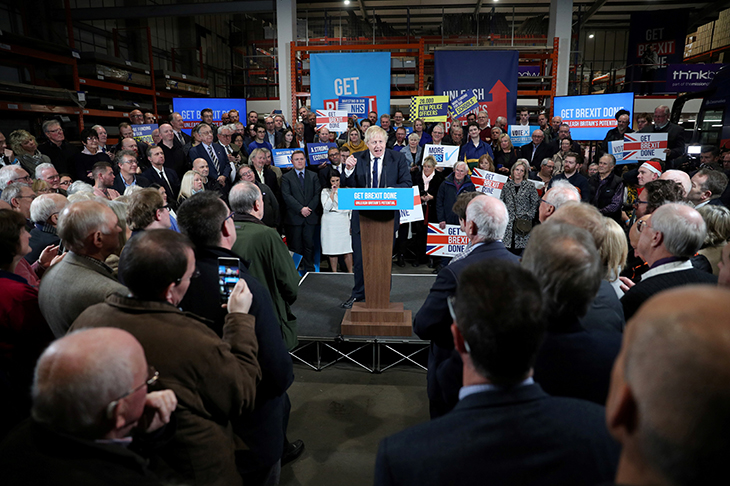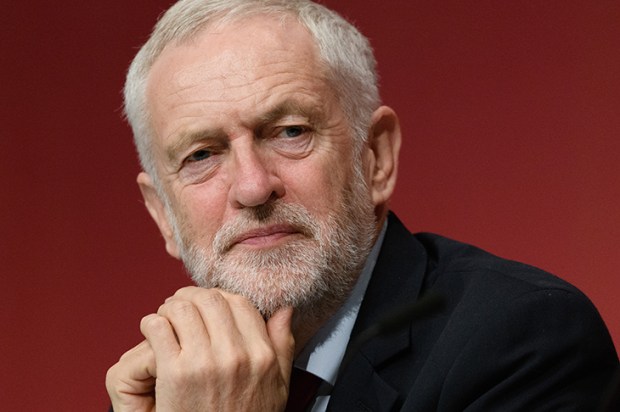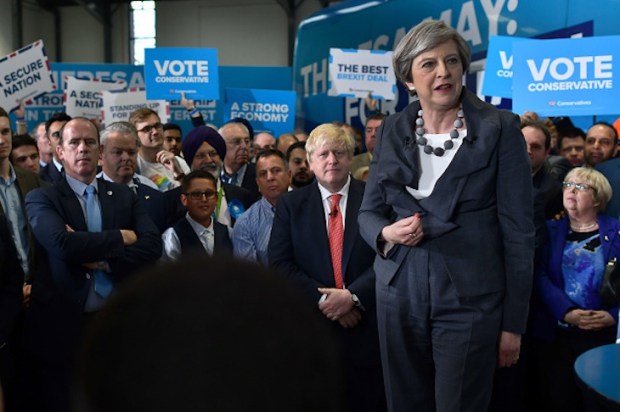It’s time to stick my neck out. What follows is anecdotal and my hunches have often been wrong. But I think that though Boris Johnson will get his overall majority, Tory strategists’ hopes of surfing a tidal wave of new support from ‘tribal’ Labour voters in the English Midlands and the North will not be fulfilled. Mr Johnson will win this time, but there will be no substantial and enduring shift northwards of Tory support.
I live in the north Midlands. The two closest constituencies to that (safe) Conservative seat of Derbyshire Dales neatly fit the description political pundits offer of the sometimes struggling Midlands and northern seats where Johnson’s Tories hope to make huge, game-changing advances on 12 December.
These are not wastelands, and they include some lovely English countryside, winding lanes and picturesque villages, so why do I say ‘sometimes struggling’? Because before the 1980s, in much of the eastern part of Derby-shire and across into Nottinghamshire and South Yorkshire, coal mining and its associated industries were very important, not only as employers but as the shapers of community. Hundreds of thousands of jobs depended directly or indirectly on those coalfields. Pit villages abounded in the two constituencies I know best, Bolsover and North East Derbyshire, and people were tribal in their party loyalties. It was Labour, always Labour, Labour till we die.
Such villages still feel like pit villages, but without the pit. Local economies were hit very hard by the death of coal mining in England. In places there lingers some sense of not just economic but spiritual and cultural loss. Patchily, prosperity is returning, but there remains in many communities the sense of a lost world.
And that world was Labour. By 2017 North East Derbyshire had not returned a Tory since 1931. Bolsover has been Labour ever since the seat was created after the second world war. But gradually, very gradually, Labour majorities (though apparently impregnable at first) have been shrinking. In Bolsover, Dennis Skinner’s was down to some 5,000 last time. It only dipped below 20,000 for the first time in 1979. And in North East Derbyshire a new MP, the Tories’ Lee Rowley— who as Conservative candidate had been whittling the Labour majority steadily away for years — finally broke through at the last election.
But there was never a landslide there: just a slow erosion of massive Labour support. In the five elections in this century, Labour’s majority in North East Derbyshire has been 12,585, 10,065, 2,445, 1,883 — and then in 2017, minus 2,861, when Rowley won.
Though I cannot speak for him (a friend), I think he will forgive my saying that, despite being a comparatively young MP, he has achieved his breakthrough in the old-fashioned way. Not in the slipstream of some great national rush of support for new policies or a new party leadership, but by knowing his patch intimately (he is helped by being local) and getting right inside the things that matter to his voters: roads, planning, fracking, the route of HS2. He bedded in early and stayed there, for years, gradually and doggedly getting himself known.
Yet even now that he’s well-known, even now that he’s respected on all sides as no carpet-bagger, his approach to winning elections is the classic and time-honoured one: do the groundwork to identify your supporters and get them out to vote. That’s the first and biggest thing. Don’t dream of mass conversions of those who have never supported your party, but find the streets, the private housing estates, the leafy and less leafy drives, the long avenues and crescents where each house has a nicely laid hard-standing for one or hopefully two cars and a well-maintained small garden at the front.
These are the ballast and backbone of your vote. A great many will stick with you through thick and thin: they are natural Conservatives, and you will find them in every walk of life. There will be plenty in council estates too, but a minority, and you’ll need to know where they are. If you can win, they will comprise three quarters of the vote that took you over the finishing line. Hug them close.
That doesn’t mean giving up on less promising places. A good candidate will always make personal conversions. But they will come in twos and threes, or pockets where you’ve been able to help in ways that get remembered.
And time and again, it isn’t ideology that will win it. People have views, of course. Brexit (Rowley is a Brexiter) will bring you some new support from people who feel very strongly about this single issue (and lose you a bit among those who feel strongly the other way) but the key to Rowley’s success is a mixture of demographics and hard work. He is clawing in the votes in the hundreds, not the thousands, but without dreaming of landslides. He’s consolidating. Most of his Labour-supporting constituents in most of his pit villages and estates will still be Labour on 13 December. More than a few, though (I believe), will have stayed at home on the previous day. Jeremy Corbyn is not liked, even by his party’s supporters. Some will bite their lip and vote. Others won’t bother. They will not, however, be flocking to the Tories. Turnout among Tories is boosted, and among Labour voters chilled, by Mr Corbyn. But that is not the same as a mass conversion.
Next door in Bolsover it’s the same, exacerbated (for Labour) by a widely held opinion that Dennis Skinner should have called it a day some time ago. Here, it really is one more heave for the Tories. And constituency by constituency, in the regions where I expect the Conservatives to make substantial but not spectacular gains, it will be the same. Dejection in the Labour tribe and anxious determination in the Tory tribe will undoubtedly bring its harvest, and for Johnson this time it should be enough. This time.
The tectonic plates, however, are not shifting. Tories should remember what Lee Rowley does remember: on which side their bread is buttered.
Got something to add? Join the discussion and comment below.
Get 10 issues for just $10
Subscribe to The Spectator Australia today for the next 10 magazine issues, plus full online access, for just $10.
You might disagree with half of it, but you’ll enjoy reading all of it. Try your first month for free, then just $2 a week for the remainder of your first year.















Comments
Don't miss out
Join the conversation with other Spectator Australia readers. Subscribe to leave a comment.
SUBSCRIBEAlready a subscriber? Log in